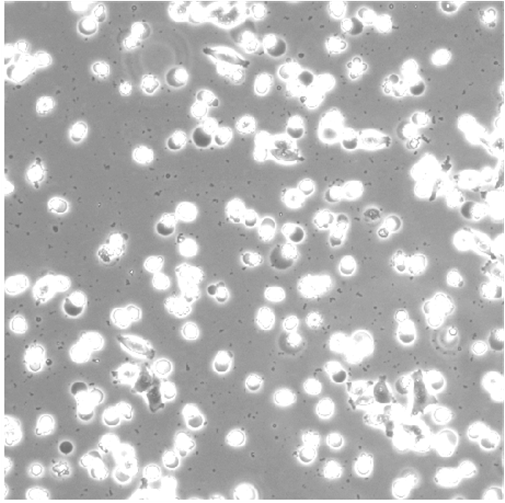Ascertaining the metabolic state of diseased human colorectal crypts to determine their susceptibility to treatment with a prototype therapeutic
Overview
Colorectal cancer is the third most common type of cancer in the UK and in the USA and the second most common cause of cancer-related death. The global economic impact of colorectal cancer is estimated at $99 billion, excluding the costs of patient therapy. Jo Milner's research group has invented a novel method for selective killing of human colorectal cancer cells without adverse effects on normal, non-cancer cells. This is a modified version of siRNA, called 'crook' siRNA (reflecting its resemblance to a shepherd’s crook) that targets a particular gene product in diseased cells. This 'crook' siRNA contains a novel short deoxyribonucleic acid (DNA) extension that simultaneously protects it from degradation and allows the molecule to be traced. Funding has been used to successfully confirm one final element of the method: the viability of comparing ex vivo cancer tissue with normal tissue in testing the efficacy of the newly developed siRNA therapeutic.
In detail
Colorectal cancer is the third most common type of cancer in the UK and in the USA and the second most common cause of cancer-related death. The global economic impact of colorectal cancer is estimated at $99 billion, excluding the costs of patient therapy. Jo Milner's research group has invented a novel method for selective killing of human colorectal cancer cells without adverse effects on normal, non-cancer cells. Funding has been used to confirm one final element of the method.
For a wide variety of both normal and mutant genes, their expression has been shown to be causative or permissive for the initiation and/or progression of many disease processes. Consequently, methods that can specifically remove a target gene product from diseased cells represent attractive therapeutic approaches. Prominent among such methods is a cellular process called RNA interference (RNAi).
RNAi exploits an innate molecular mechanism that, following introduction of double-stranded RNA within a cell, degrades single-stranded messenger RNA (mRNA) molecules that are complementary in sequence to one or other strand. Since mRNA molecules are the transcribed products of genes, using RNAi to eliminate mRNAs arising from a specific gene effectively silences expression of that gene. Typically, short interfering RNA (siRNA) duplexes of 19 to 21 nucleotides in length are used to elicit an RNAi effect because longer duplexes provoke a cellular stress response that leads to off-target effects.
A major obstacle to using RNAi as a therapy is that the siRNA molecules that need to be introduced within cells to initiate the process are rapidly broken down, especially in the extracellular environment (e.g. in the bloodstream). Consequently, delivering an effective dose is difficult. The research group has developed a modified version of siRNA, called 'crook' siRNA (reflecting its resemblance to a shepherd’s crook), that contains a short deoxyribonucleic acid (DNA) extension that confers resistance to degradation; this is an important innovation for therapeutic applications of RNAi. The DNA extension embodied in crook siRNA does not perturb its function in the cellular RNAi process; target inhibition is as efficient and as specific as would be the case for unmodified siRNA. This situation contrasts with stabilising modifications made to RNA nucleotides, which often give rise to siRNAs with reduced specificity.
In addition to conferring resistance to degradation, the DNA extension on crook siRNA enables quantification down to aM levels per cell. This is important since the process of RNAi is induced by very low levels of siRNA, below the threshold of routine detection methods. Using crook siRNA will permit detection of the therapeutic agent in the course of pharmacodynamic and other studies during its pre-clinical development.
A convenient model for testing the usefulness of crook siRNA in therapeutic applications is colorectal cancer; and research previously undertaken by the group has shown that cultured colorectal cancer cell lines, but not normal cells, are killed by depletion of mRNA transcribed from the gene SIRT1. The underlying mechanism for the cancer cell-specific killing by SIRT1 RNAi is thought to be dependent upon a metabolic anomaly common among cancer cells- a reliance on glycolytic rather than oxidative metabolism, even in the presence of oxygen. As a result of the C2D2 funded project it has now been demonstrated that colorectal cancer tissue taken directly from patients maintains glycolytic metabolism for sustained periods of ex vivo culture, whereas normal colorectal tissue is preferentially oxidative. This is a valuable demonstration of the suitability and relevance of ex vivo cancer tissue versus normal tissue studies in evaluating clinical applications for crook siRNA and for the chosen gene target, SIRT1.
Beyond the wide range of possible therapeutic applications for RNAi induced by crook siRNA, SIRT1 may itself be a therapeutic gene target with manifold uses, having been implicated not only in cancer of various types, but also in metabolic disorders, neurodegenerative diseases, immunological conditions and others.
Outputs
Publications
- Allison S.J. & Milner J. (2014). RNA Interference by Single- and Double-stranded siRNA With a DNA Extension Containing a 3' Nuclease-resistant Mini-hairpin Structure. Mol Ther Nucleic Acids, 7 (2) [e141] doi: 10.1038/mtna.2013.68
Principal Investigator
Professor Paul Kaye
Centre for Immunology and Infection
paul.kaye@york.ac.ukCo-Investigators
Professor Jo Milner
Department of Biology
jo.milner@york.ac.uk

